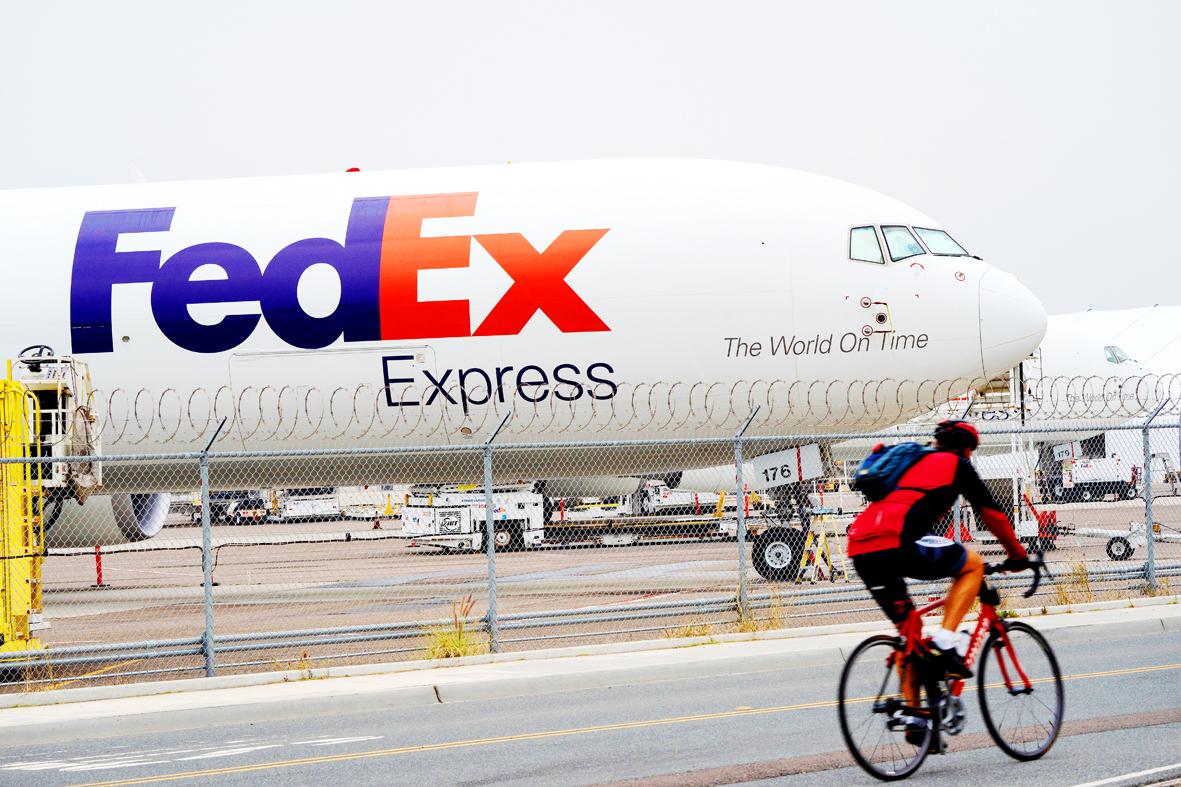FedEx Corp plans to hire about 70,000 seasonal workers to handle the holiday surge of packages, up 27 percent from last year’s peak, in what is expected to be an unprecedented level of delivery demand.
The courier has already added thousands of workers to keep up with a jump in deliveries as people order more online amid the COVID-19 pandemic.
FedEx’s US ground deliveries rose 20 percent in the quarter through May from a year earlier.

Photo: Bloomberg
The company is likely to match or exceed that for its fiscal first quarter, which ended last month.
To keep up with demand, FedEx also would expand the availability of Sunday delivery service to 95 percent of the US population by the middle of this month.
It has built more automated sorting centers and added capacity to handle oversize packages.
“These strategic investments will help better support what is expected to be an unprecedented holiday shipping season,” FedEx chief operating officer Raj Subramaniam said in a statement on Thursday.
FedEx and United Parcel Service Inc (UPS) have benefited from people ordering more online. That has helped propel FedEx’s shares to surge 51 percent this year through Wednesday and UPS to jump 42 percent, compared with an 11 percent rise in the S&P 500.
If the gains hold, they would be the biggest annual stock increases for both companies since 2013.
FedEx fell 3.1 percent to US$220.82 at 2:33pm in New York as the broader market tumbled.
The surge of online shopping will stick even after there is a vaccine for the coronavirus, FedEx chief marketing officer Brie Carere said.
The company accelerated its estimate for when the US market would reach 100 million packages a day to 2023, three years earlier than previously expected, Carere said.
Almost 96 percent of that growth would come from e-commerce and that volume should give FedEx more leverage to raise prices.
“With the growth of e-commerce and the increased need for our industry, and FedEx services in particular, we see increased revenue quality,” Carere said in an interview. “I absolutely think that fundamentally, that yield per shipment will continue to increase and accelerate.”
FedEx also is attempting to lower the cost of e-commerce deliveries by, for example, taking on packages it used to hand off to the US Postal Service and moving to seven-day operations.
Residential shipments are less profitable than business deliveries because fewer packages are left at each home and more driving between stops is required.
More than 60 percent of former SmartPost packages, lower-priced items that had been transferred to the post office for final delivery, are now handled in house, Carere said.
By the end of November it will be the “vast majority,” she said.
The move helps increase the number of packages per stop, or density, she said.
“We are seeing significant improvement in route density as well as neighborhood density. We’re reducing miles per stop,” Carere said. “That strategy has definitely been a winner for us.”
FedEx in June announced peak-season surcharges on its largest customers for the first time in a couple of years, helping to boost revenue and ease pressure on its network.
That would become “a new norm,” Carere said.
The company also is working with large shippers to pre-sort packages before turning them over to FedEx and to increase volume on Sundays, when the network has more capacity.

Quanta Computer Inc (廣達) chairman Barry Lam (林百里) is expected to share his views about the artificial intelligence (AI) industry’s prospects during his speech at the company’s 37th anniversary ceremony, as AI servers have become a new growth engine for the equipment manufacturing service provider. Lam’s speech is much anticipated, as Quanta has risen as one of the world’s major AI server suppliers. The company reported a 30 percent year-on-year growth in consolidated revenue to NT$1.41 trillion (US$43.35 billion) last year, thanks to fast-growing demand for servers, especially those with AI capabilities. The company told investors in November last year that

Intel Corp has named Tasha Chuang (莊蓓瑜) to lead Intel Taiwan in a bid to reinforce relations between the company and its Taiwanese partners. The appointment of Chuang as general manager for Intel Taiwan takes effect on Thursday, the firm said in a statement yesterday. Chuang is to lead her team in Taiwan to pursue product development and sales growth in an effort to reinforce the company’s ties with its partners and clients, Intel said. Chuang was previously in charge of managing Intel’s ties with leading Taiwanese PC brand Asustek Computer Inc (華碩), which included helping Asustek strengthen its global businesses, the company

Taiwanese suppliers to Taiwan Semiconductor Manufacturing Co. (TSMC, 台積電) are expected to follow the contract chipmaker’s step to invest in the US, but their relocation may be seven to eight years away, Minister of Economic Affairs J.W. Kuo (郭智輝) said yesterday. When asked by opposition Chinese Nationalist Party (KMT) Legislator Niu Hsu-ting (牛煦庭) in the legislature about growing concerns that TSMC’s huge investments in the US will prompt its suppliers to follow suit, Kuo said based on the chipmaker’s current limited production volume, it is unlikely to lead its supply chain to go there for now. “Unless TSMC completes its planned six

Power supply and electronic components maker Delta Electronics Inc (台達電) yesterday said it plans to ship its new 1 megawatt charging systems for electric trucks and buses in the first half of next year at the earliest. The new charging piles, which deliver up to 1 megawatt of charging power, are designed for heavy-duty electric vehicles, and support a maximum current of 1,500 amperes and output of 1,250 volts, Delta said in a news release. “If everything goes smoothly, we could begin shipping those new charging systems as early as in the first half of next year,” a company official said. The new